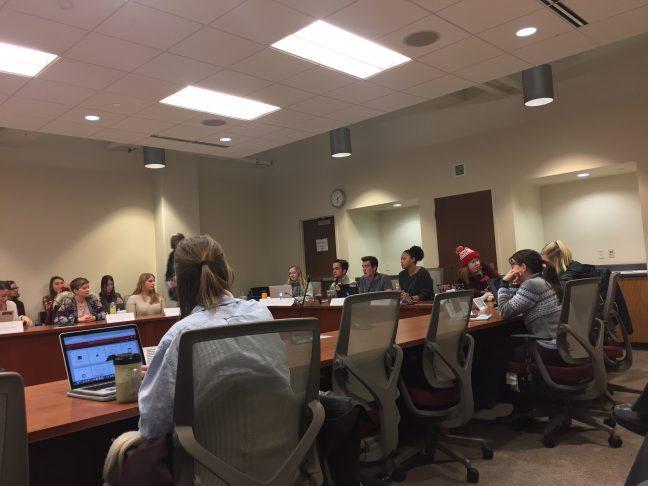The hotly contested meal plan that is coming to campus next fall was the subject of debate on Tuesday when director of University Dining and Housing Jeff Novak, spoke at an Associated Students of Madison Student Council meeting.
Two students spoke about the meal plan and the detrimental mental health effects that it would have on students across campus. Rena Yehuda Newman said that students with dietary restrictions are limited to few options in the dining halls and causes distress about food variety and availability for students with specific religious and dietary needs.
Second meal plan protest ends in march, poster taped on UW Housing office
“The overwhelming majority of comments described how this meal plan was discriminatory against low-income students, and many current students and alumni have said that if this policy had been in place when they started school, they would not have been able to afford it,” Newman said.
Newman suggested that there should be clear and visible opt-out options for students who do not wish to participate in the meal plan, along with a way to allow students to get money out of their accounts.
Along with that, Newman suggested that a pool of money be collected from students of high-income families and have that money evenly distributed out to low-income students in order to help with the costs of the new plan.
“This policy was created and unveiled with nearly no student input or transparency,” Newman said.
After students spoke, Novak took the podium and assured attendees that measures were being taken to ensure that all students can eat on campus.
Novak said that the two main reasons the new plan was adopted was financial predictability for both students and parents and to increase sales in places like the dining halls in order to keep prices low for the upcoming years.
“As we were examining options we did talk to students and talked to advising boards, and I do understand that the interactions that would have been preferred by some should have been different,” Novak said. “We don’t sit in our offices in isolation, we listen.”
University Housing modifies meal plan policy to include opt out option
While dining halls have had declining sales in past years, University Dining and Housing is okay from a fiscal perspective, Novak explained.
The a la carte model of the dining halls has always been unique at UW but the new model would allow for better planning and budgeting on both sides of the program, Novak said.
“Our money comes directly from those we serve,” Novak said. “Students who pay rent and those who dine are so unequivocally important for us to strive to make sure that we are meeting every expectation and make sure it is the best place to live.”
Along with the opt-out option, students can now pay the $1400 in quarterly installments and use the money at both dining halls and union facilities. Novak stated that of the 1,300 students that have signed up to live with housing next year, only two have had questions about the new program and have been exempted from it.
Voting on the creation of the new First Year Involvement Committee was set for Tuesday but was postponed until the next ASM meeting on April 3 in order to clarify wording.







